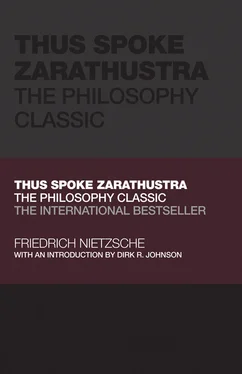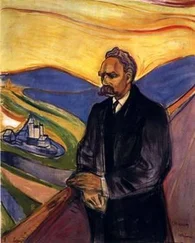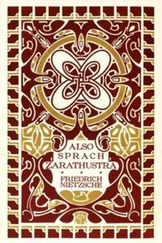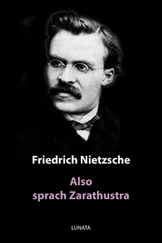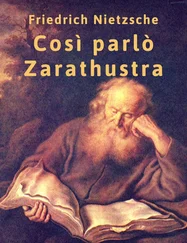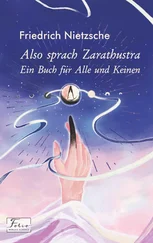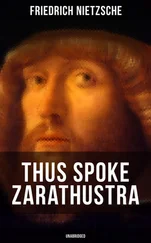Friedrich Nietzsche - Thus Spoke Zarathustra
Здесь есть возможность читать онлайн «Friedrich Nietzsche - Thus Spoke Zarathustra» — ознакомительный отрывок электронной книги совершенно бесплатно, а после прочтения отрывка купить полную версию. В некоторых случаях можно слушать аудио, скачать через торрент в формате fb2 и присутствует краткое содержание. Жанр: unrecognised, на английском языке. Описание произведения, (предисловие) а так же отзывы посетителей доступны на портале библиотеки ЛибКат.
- Название:Thus Spoke Zarathustra
- Автор:
- Жанр:
- Год:неизвестен
- ISBN:нет данных
- Рейтинг книги:5 / 5. Голосов: 1
-
Избранное:Добавить в избранное
- Отзывы:
-
Ваша оценка:
- 100
- 1
- 2
- 3
- 4
- 5
Thus Spoke Zarathustra: краткое содержание, описание и аннотация
Предлагаем к чтению аннотацию, описание, краткое содержание или предисловие (зависит от того, что написал сам автор книги «Thus Spoke Zarathustra»). Если вы не нашли необходимую информацию о книге — напишите в комментариях, мы постараемся отыскать её.
Thus Spoke Zarathustra: A Philosophy Classic, Thus Spoke Zarathustra: A Philosophy Classic
Thus Spoke Zarathustra — читать онлайн ознакомительный отрывок
Ниже представлен текст книги, разбитый по страницам. Система сохранения места последней прочитанной страницы, позволяет с удобством читать онлайн бесплатно книгу «Thus Spoke Zarathustra», без необходимости каждый раз заново искать на чём Вы остановились. Поставьте закладку, и сможете в любой момент перейти на страницу, на которой закончили чтение.
Интервал:
Закладка:
The hour when you say: “What good is my reason! Does it long for knowledge as the lion for his food? It is poverty and pollution and wretched self‐complacency!”
The hour when you say: “What good is my virtue! As yet it has not made me passionate. How weary I am of my good and my bad! It is all poverty and pollution and wretched self‐complacency!”
The hour when you say: “What good is my justice! I do not see that I am fervor and fuel. The just, however, are fervor and fuel!”
The hour when you say: “What good is my pity! Is not pity the cross on which he is nailed who loves man? But my pity is not a crucifixion.”
Have you ever spoken thus? Have you ever cried thus? Ah! would that I had heard you crying thus!
It is not your sin – it is your self‐satisfaction that cries unto heaven; your very sparingness in sin cries unto heaven!
Where is the lightning to lick you with its tongue? Where is the frenzy with which you should be inoculated?
Lo, I teach you the Superman: he is that lightning, he is that frenzy!
When Zarathustra had thus spoken, one of the people called out: “We have now heard enough of the rope‐dancer; it is time now for us to see him!” And all the people laughed at Zarathustra. But the rope‐dancer, who thought the words applied to him, began his performance.
4.
Zarathustra, however, looked at the people and wondered. Then he spoke thus:
Man is a rope stretched between the animal and the Superman – a rope over an abyss.
A dangerous crossing, a dangerous wayfaring, a dangerous looking‐back, a dangerous trembling and halting.
What is great in man is that he is a bridge and not a goal: what is lovable in man is that he is an OVER‐GOING and a DOWN‐GOING.
I love those that know not how to live except as down‐goers, for they are the over‐goers.
I love the great despisers, because they are the great adorers, and arrows of longing for the other shore.
I love those who do not first seek a reason beyond the stars for going down and being sacrifices, but sacrifice themselves to the earth, that the earth of the Superman may hereafter arrive.
I love him who lives in order to know, and seeks to know in order that the Superman may hereafter live. Thus seeks he his own down‐going.
I love him who labors and invents, that he may build the house for the Superman, and prepare for him earth, animal, and plant: for thus seeks he his own down‐going.
I love him who loves his virtue: for virtue is the will to down‐going, and an arrow of longing.
I love him who reserves no share of spirit for himself, but wants to be wholly the spirit of his virtue: thus walketh he as spirit over the bridge.
I love him who makes his virtue his inclination and destiny: thus, for the sake of his virtue, he is willing to live on, or live no more.
I love him who desires not too many virtues. One virtue is more of a virtue than two, because it is more of a knot for one's destiny to cling to.
I love him whose soul is lavish, who wants no thanks and does not give back: for he always bestows, and desires not to keep for himself.
I love him who is ashamed when the dice fall in his favor, and who then asks: “Am I a dishonest player?” – for he is willing to succumb.
I love him who scatters golden words in advance of his deeds, and always does more than he promises: for he seeks his own down‐going.
I love him who justifies the future ones, and redeems the past ones: for he is willing to succumb through the present ones.
I love him who chastens his God, because he loves his God: for he must succumb through the wrath of his God.
I love him whose soul is deep even in the wounding, and may succumb through a small matter: thus goes he willingly over the bridge.
I love him whose soul is so overfull that he forgets himself, and all things are in him: thus all things become his down‐going.
I love him who is of a free spirit and a free heart: thus is his head only the bowels of his heart; his heart, however, causes his down‐going.
I love all who are like heavy drops falling one by one out of the dark cloud that lowers over man: they herald the coming of the lightning, and succumb as heralds.
Lo, I am a herald of the lightning, and a heavy drop out of the cloud: the lightning, however, is the SUPERMAN.
5.
When Zarathustra had spoken these words, he again looked at the people, and was silent.
“There they stand,” said he to his heart; “there they laugh: they understand me not; I am not the mouth for these ears.
Must one first batter their ears, that they may learn to hear with their eyes? Must one clatter like kettledrums and penitential preachers? Or do they only believe the stammerer?
They have something whereof they are proud. What do they call it, that which makes them proud? Culture, they call it; it distinguishes them from the goatherds.
They dislike, therefore, to hear of ‘contempt’ of themselves. So I will appeal to their pride.
I will speak unto them of the most contemptible thing: that, however, is THE LAST MAN!”
And thus spoke Zarathustra unto the people:
It is time for man to fix his goal. It is time for man to plant the germ of his highest hope.
Still is his soil rich enough for it. But that soil will one day be poor and exhausted, and no lofty tree will any longer be able to grow thereon.
Alas! there comes the time when man will no longer launch the arrow of his longing beyond man – and the string of his bow will have unlearned to whizz!
I tell you: one must still have chaos in one, to give birth to a dancing star. I tell you: you have still chaos in you.
Alas! There comes the time when man will no longer give birth to any star. Alas! There comes the time of the most despicable man, who can no longer despise himself.
Lo! I show you THE LAST MAN.
“What is love? What is creation? What is longing? What is a star?” – so asks the last man and blinks.
The earth has then become small, and on it there hops the last man who makes everything small. His species is ineradicable like that of the ground‐flea; the last man lives longest.
“We have discovered happiness,” say the last men, and blink thereby.
They have left the regions where it is hard to live; for they need warmth. One still loves one's neighbor and rubs against him; for one needs warmth.
Turning ill and being distrustful, they consider sinful: they walk warily. He is a fool who still stumbles over stones or men!
A little poison now and then: that makes pleasant dreams. And much poison at last for a pleasant death.
One still works, for work is a pastime. But one is careful lest the pastime should hurt one.
One no longer becomes poor or rich; both are too burdensome. Who still wants to rule? Who still wants to obey? Both are too burdensome.
No shepherd, and one herd! Everyone wants the same; everyone is equal: he who has other sentiments goes voluntarily into the madhouse.
“Formerly all the world was insane,” say the subtlest of them, and blink thereby.
They are clever and know all that has happened: so there is no end to their raillery. People still fall out, but are soon reconciled – otherwise it spoils their stomachs.
They have their little pleasures for the day, and their little pleasures for the night, but they have a regard for health.
“We have discovered happiness,” say the last men, and blink thereby.
And here ended the first discourse of Zarathustra, which is also called “The Prologue”: for at this point the shouting and mirth of the multitude interrupted him. “Give us this last man, Oh Zarathustra,” they called out, “make us into these last men! Then will we make you a present of the Superman!” And all the people exulted and smacked their lips. Zarathustra, however, turned sad, and said to his heart:
Читать дальшеИнтервал:
Закладка:
Похожие книги на «Thus Spoke Zarathustra»
Представляем Вашему вниманию похожие книги на «Thus Spoke Zarathustra» списком для выбора. Мы отобрали схожую по названию и смыслу литературу в надежде предоставить читателям больше вариантов отыскать новые, интересные, ещё непрочитанные произведения.
Обсуждение, отзывы о книге «Thus Spoke Zarathustra» и просто собственные мнения читателей. Оставьте ваши комментарии, напишите, что Вы думаете о произведении, его смысле или главных героях. Укажите что конкретно понравилось, а что нет, и почему Вы так считаете.
